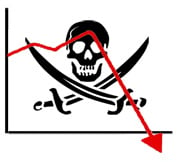[Most Recent Entries] [Calendar View]
Tuesday, February 26th, 2019
| Time | Event |
| 11:55a | Piracy Is Driven By Availability & Price, People Prefer Not to Break the Law, ISP Study Says  While free media has always been attractive to those traversing torrent sites, streaming platforms, and similar services, there have always been complaints that price is just one piece of the puzzle. Often painted as cheapskates, people who pirate have historically been at the cutting edge of content availability, obtaining movies and music quickly, with legal alternatives scrambling in their wake. Over the years, of course, both the music and movie industries have taken giant strides in bridging the gap, making lots of content available and, in the case of Netflix and Spotify, for example, often at a reasonable price. As a result, millions of citizens are taking advantage of these offers. According to a new study commissioned by New Zealand telecoms group Vocus Group NZ and conducted in December 2018, this enhanced availability is having a positive effect. “Legitimate streaming content providers are achieving what was impossible for Hollywood to get right: they are stamping out piracy by making available the shows people want to enjoy at reasonable cost and with maximum convenience,” Vocus announced this morning. The company believes that “piracy is dying a natural death” as more locals choose to access content legitimately, via legal services that are both accessible and easier to use than pirate options. “In short, the reason people are moving away from piracy is that it’s simply more hassle than it’s worth,” says Taryn Hamilton, Consumer General Manager at Vocus Group. “The research confirms something many internet pundits have long instinctively believed to be true: piracy isn’t driven by law-breakers, it’s driven by people who can’t easily or affordably get the content they want.” An overwhelming majority (75%) of those surveyed said that free-to-air TV services are their weapons of choice for viewing content, with 61% utilizing free on-demand channels offered by broadcasters. Around 58% of respondents said they visit the cinema, with paid streaming services such as Netflix utilized by 55%. Of course, piracy still figures into the equation but according to Vocus, the practice is on a downward trend. “The big findings are that whilst about half of people have pirated some content in their lives, the vast majority no longer do so because of the amount of paid streaming sites that they have access to,” Hamilton added in a video interview with NZHerald. Indeed, the company’s study shows that 11% of consumers now obtain copyrighted content via illegal streaming platforms, with around 10% downloading infringing content via torrent and similar services. “Generally the survey has said that the vast minority of people are undertaking piracy – it’s just too hard. People prefer to pay for good quality, cheap, legal content, so we think that’s the best way forward,” Hamilton said. While Vocus says it conducted its research to validate its view of the market and the belief that streaming services are key to dealing with piracy, the company also has other concerns. A review of New Zealand’s Copyright Act is underway and Hamilton expresses a preference for dialog over legal action. “We certainly don’t want a judicial approach, where it goes in front of a court and one judge sets precedent. We think it should be debated through the copyright amendment process,” he added. In January 2018, the Motion Picture Distributors’ Association, which represents the major Hollywood studios in New Zealand, said that “nothing” can be done to tackle piracy in the country other than site-blocking. Vocus, however, is opposed to this type of action. The company believes that while the overall appetite for piracy is on the wane, its research shows that just 22% of respondents believe that it’s possible to stop pirates using blocking, with the remainder thinking pirates are just too savvy. “The simple fact for those who know anything about the “People know there are multiple sites where it is possible to download illegal material. They also know that blocking the most popular ones simply means you’ll get pirated material elsewhere.” In conclusion, Vocus insists that the solution can be found using a straightforward formula – give people the content they want, in a format they can consume, at a price they can afford. “Piracy is finally dying. The reason for that requires an understanding of why people pirated in the first place. They didn’t do it because of inherent criminality, but rather because they couldn’t get the shows they wanted at a price they were prepared to pay,” Hamilton concludes.
Source: TF, for the latest info on copyright, file-sharing, torrent sites and more. We also have VPN reviews, discounts, offers and coupons. |
| 7:50p | Oscars Screener Leaks Drop to All-Time Low
On Sunday, Hollywood’s finest gathered at the red carpet once again. Bohemian Rhapsody, Black Panther, Green Book, and Roma emerged as the big winners, all winning multiple awards. Elsewhere in Hollywood, there may have been a celebration of a different kind as well. The months leading up to the Oscars is usually a time when some of the most high-profile leaks take place. However, this year there were fewer screener leaks than before. Many of the screeners that appear on pirate sites are linked to the Oscars. The films are sent out to voting members and, despite tough security measures, some always fall into the hands of outsiders. This also happened this year. With “Green Book” and “Ralph Breaks the Internet,” the first pirated DVD screeners made their way onto various pirate sites in December. However, the rate at which the screeners have leaked this year is significantly lower than before. Relying on data released by Oscar piracy watcher Andy Baio, we see that screeners for only seven of the nominated* films leaked before the awards ceremony. That’s roughly half of what we were used to seeing during previous years. As can be seen below, the number of leaked screeners has gradually declined over the past decade-and-a-half, from a high of 29 in 2007 to seven this year.  We should be cautious of drawing strong conclusions, but there are some hints that could explain the drop. According to the pirate release group EVO, which leaked “Ralph Breaks the Internet,” the security on the DVD they got their hands on was stronger than before. “From what I’ve seen, doing Ralph, the DVD protection on it was increased, since it was a nightmare to crack,” a EVO team member informed us previously Hive-CM8, the group that was responsible for most leaks in recent years, also signaled a possible reason for the slowdown. The group apparently lost access to its mail and website, which meant that many important contacts are gone as well. “Since we lost our site/mail with no backup and with it all contacts gone, it’s quite complicated to get things going this year. We want to get things back as they were, but it will take time,” they said early on. It’s also worth noting that there’s a limited number of groups getting involved in these screener leaks. Perhaps it’s harder to get access nowadays, or other groups simply decided to avoid these high profile releases, as they are associated with a higher risk. Finally, the state of the movie industry may also play a significant role in the decreased number of screener leaks. This is a point that was previously raised by Andy Baio. Screeners are generally only released if there is no higher quality leak out already. Since release windows are getting smaller and WebRips and Web-DLs are more common, screeners are less relevant. This is also what we see in the data. The graphs below show the number of leaked screeners dropped from more than 75% to under 25% over the past several years. However, the number of high-quality leaks remained fairly constant, around or above 90%.  As a concrete example, Netflix’s Oscar nominee “The Ballad of Buster Scruggs” was already out on pirate sites as a high-quality WebRip in November, before the screener version went out. Also, Netflix’s big Oscar winner Roma leaked in a high-quality format a few days after the first screener was sent. When high-quality releases are already available, release groups have no incentive to put a screener version out. Hence, there are fewer screeners by definition. While there’s no doubt that the number of leaked screeners at the Oscar night was at an all-time low this year, it’s hard to pinpoint a single reason. Perhaps all the factors mentioned contributed to the drop, one way or another. In any case, it’s unlikely that we will ever see 29 leaked Oscar nomination screeners in one year again, as happened in 2007. However, the widespread availability of high-quality leaks shows that piracy remains a challenge for Hollywood. — * – Foreign film and documentary categories are not included Source: TF, for the latest info on copyright, file-sharing, torrent sites and more. We also have VPN reviews, discounts, offers and coupons. |
| << Previous Day |
2019/02/26 [Calendar] |
Next Day >> |
 The Oscars is the most watched awards show of the year, closely followed by hundreds of millions of movie fans around the world.
The Oscars is the most watched awards show of the year, closely followed by hundreds of millions of movie fans around the world.